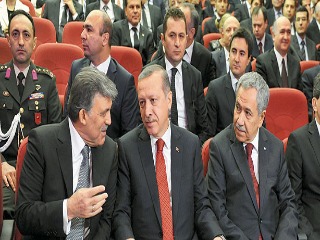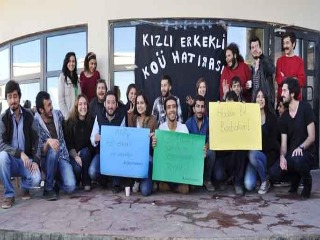BACKGROUND: Ever since the AKP ascended to power over a decade ago, the suspicions that the party ultimately intends to impose an Islamic moral agenda has lingered on among the secular portions of Turkish society. Little that the AKP did during the period 2002-11 suggested that these suspicions were well-founded. However, since his third consecutive electoral victory in 2011, Prime Minister Recep Tayyip Erdoğan has made several statements that do seem to confirm such suspicions.
Erdoğan has vowed to raise a “pious youth,” spoken out against abortion, told families how many children they should make, objected to the contents of television series, and has referred to those who drink any alcohol at all as “drunkards”. And his activity has not been confined to statements, since the AKP government has indeed imposed some restrictions on the sale of alcohol. The Gezi protests that erupted in Istanbul this summer were not least a reaction to what is perceived as a conservative version of social engineering, against the paternalism of the prime minister.
Yet those who react to Erdoğan’s conservative authoritarianism are not only the “concerned seculars” as the Westernized, urban middle class is referred to in Turkish political parlance, but increasingly – and politically more importantly – fellow Muslim conservatives as well. On November 4, the daily Zaman reported that Prime Minister Erdoğan, speaking at a closed party gathering, had instructed the authorities to carry out inspections of student homes where male and female students live together. That statement sparked an unprecedented crisis among the top leadership of the AKP government, pitting Erdoğan and Bülent Arınç, the Deputy Prime Minister, against each other. The two first clashed during the Gezi protests, when Arınç – together with President Abdullah Gül – attempted to calm the situation, showing understanding for the protesters and meeting with them; these efforts were disavowed and rendered futile by Erdoğan, who instead opted for confrontation and ordered the police to attack the demonstrators and clear the Gezi Park.
Both what happened during the Gezi protests and the recent clash between Erdoğan and Arınç has exposed mounting dissent among the top leadership of the AKP. This dissent has two sources: the leadership style of Erdoğan and an increasing, ideological divergence among the conservatives. That divergence, in turn, basically revolves around the question of how the Muslim conservatives are going to relate to and cope with change – a change that they themselves have abetted.

IMPLICATIONS: Society in Turkey is changing rapidly as a result of rising levels of income and education, and this is happening very much as a result of the AKP’s own policies. This socio-economic change brings with it novelties that inevitably unsettle traditions and conservative mores among the base of the AKP. One such novelty – until recently unheard of in Turkey’s conservative heartland and something that is utterly shocking for those with conservative sensibilities – is the practice of unmarried male and female university students sharing apartments.
The AKP government has invested significant energy in the endeavor to open universities in the rural cities of Anatolia; as a result, and also as a consequence of rising levels of income among the Anatolian conservative middle class who can now afford to send their sons and daughters to university – and who now have the option of choosing a nearby university – cities in the conservative heartland of Turkey have become acquainted with a university life-style that includes coed student homes.
The same day that the daily Zaman reported that Erdoğan had vowed to order an inspection of the mixed-sex student homes, Deputy Prime Minister Arınç, who is also the spokesperson of the government, made a statement denying the veracity of the news; he also added that the authorities do not have the right to carry out such inspections.
But Erdoğan subsequently publicly endorsed the views that he had expressed at the closed party gathering, disavowing his deputy prime minister and spokesperson. Meeting the press during a visit to Finland on November 5, Erdoğan said that “the houses where female and male students stay together are going to be inspected”, that “the clear majority of mothers and fathers won’t approve of mixed houses” and that “what is lived there is not a legitimate life.” Erdoğan added that he is not a politician who does not abide with what he has once stated.
Arınç’s reply came on November 8, when the deputy prime minister, interviewed on Turkish state television, said that he is not “somebody’s sand bag” and invited Erdoğan to explain the contradictions between them, as he was the one responsible for them. Arınç said “I am not only a cabinet minister. I have a unique weight.” Indeed, Arınç was one of the co-founders of the AKP, and is a former speaker of parliament.
Not only did Arınç object to Erdoğan’s treatment of him, but he also reiterated his principally based objection, reminding that the law does not admit any interference in the private lives of people.
Erdoğan reacted to Arınç’s outburst on November 12, when he addressed the parliamentary group the AKP. He assured that issues of contention were going to be resolved internally, and he implored Arınç – without naming him – not to make “enemies happy” by making statements to the media. But Erdoğan significantly refrained from reiterating the vow that student homes were going to be “inspected”. Indeed, Erdoğan had for all intents and purposes already retracted by stating to journalists after Arınç went on state television that “People can stay with whoever they want. But we are going to heed the calls from the families.” The crisis between Erdoğan and Arınç officially ended when Arınç, speaking after a cabinet meeting on November 18, declared that “we have had a very pleasant talk with the prime minister, and I remain at my post.”
The Erdoğan-Arınç confrontation had given rise to speculations that the latter was going to resign. It is certainly unlike Erdoğan to keep a cabinet minister that had challenged him the way Arınç had done; indeed, nothing of the kind had ever happened before. But as Arınç had pointed out, he is not an ordinary cabinet minister. The fact that Erdoğan chose to abstain from taking punitive action against Arınç, and the fact that he has indicated that he does not intend to press ahead with the inspection of the student homes, demonstrates that internal counter-forces to leadership style and to his excessive conservatism can succeed in checking him, at least temporarily. However, it is unlikely that Erdoğan is going to refrain from making new statements of similar kind; as Turkey is about to enter a crucial year of elections – municipal elections in March 2014, followed by presidential election in August 2014, and general elections in 2015 – mobilizing the conservative base is going to be of highest priority for Erdoğan.
Demonstrating that he is the champion of conservative values is essential in this regard; above all, Erdoğan has an interest in maintaining a state of polarization in society in order to ensure that the fifty percent that supports the AKP remains on “war footing”, rallied behind him, ensuring his election to the presidency next year. It is partly in this light that floating ideas like inspecting mixed student homes should be seen; from Erdoğan’s perspective, they have the benefit of provoking the seculars whose anger at “Islamization” only enhances his image as the defender of religion and morality against “irreligious” seculars in the eyes of his own constituency. But Erdoğan’s conservative paternalism is also a way of demonstrating that he is responsive to the genuine concern among the conservative base over the effects that change is having on traditional values.

CONCLUSIONS: There is no doubt that Erdoğan gives voice to the concerns of his own generation, of older conservatives, but even though he has a receptive audience, the conservatives are not monolithically rallied behind the idea of pushing for an Islamic moral agenda. That was clearly demonstrated by Bülent Arınç – and by Turkey’s first lady, Hayrünnisa Gül. Gül expressed her – and no doubt her husband President Abdullah Gül’s – opposition to the idea of policing the student homes, stating that “this is something for the families to take care of. The state cannot be like a mother and father.”
The AKP has been successful because it has embraced and abetted change, which has resulted in the rise of a new middle class. As the representative of this religiously conservative new middle class, the AKP now faces the challenge of coping with the less desired – from a conservative point of view – consequences that this change has brought along.
While Erdoğan reacts with old reflexes, the two other founders of the AKP, Arınç and Gül, make clear that they don’t approve of conservative social engineering. Their disapproval of Erdoğan shows that they understand that the Muslim conservatives’ continued political success depends on their ability to remain in tune with change.
Halil M. Karaveli is Senior Fellow and Editor of the Turkey Analyst, at the Central Asia-Caucasus Institute & Silk Road Studies Program Joint Center.



